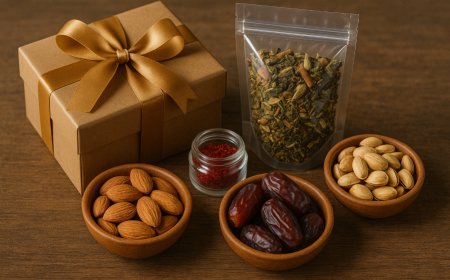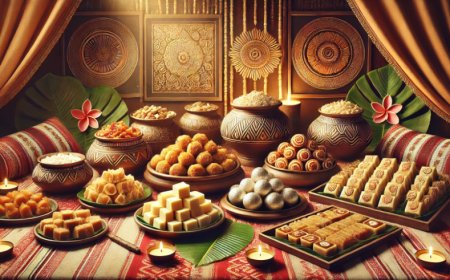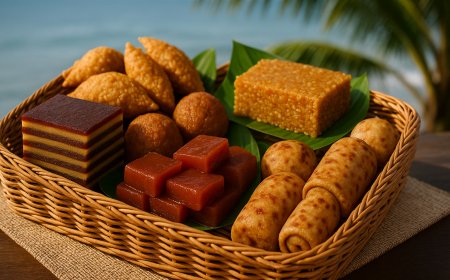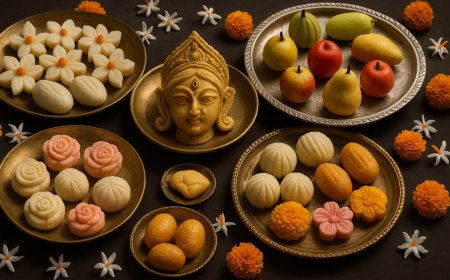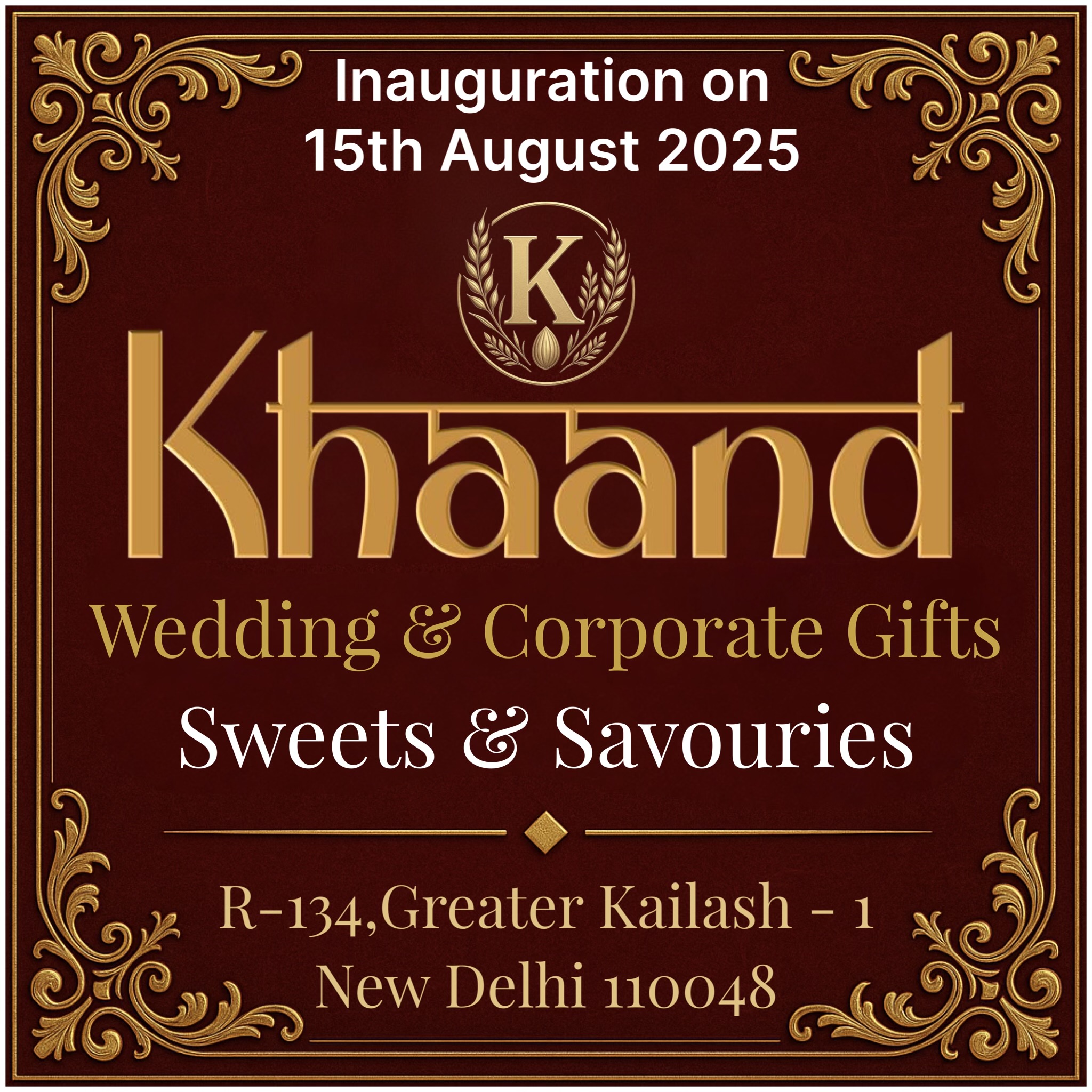Folk & Festive: Tribal Mithai Traditions from Odisha, Jharkhand & Chhattisgarh in Rustic Wedding Hampers
Discover authentic tribal mithai traditions from Odisha, Jharkhand & Chhattisgarh for rustic wedding hampers. Find forest honey sweets, indigenous preparations, and eco-friendly tribal wedding gifts.

Tribal mithai traditions from Odisha, Jharkhand, and Chhattisgarh embody centuries of forest-based living where sweet preparations reflect deep understanding of seasonal rhythms, wild ingredient harvesting, and sustainable food systems that modern society is rediscovering through organic and eco-conscious movements. These thoughtfully crafted collections showcase indigenous culinary mastery while offering contemporary wedding guests authentic experiences of India's original sustainable lifestyle and community-centered celebration traditions.
The tradition draws inspiration from ancient forest civilizations where tribal communities developed unique preservation techniques, natural sweetening methods, and seasonal preparation calendars that maximized nutritional value while minimizing environmental impact. Regional variations across Santhal, Gond, Oraon, and other tribal communities add distinctive cultural dimensions while maintaining the common thread of ecological wisdom and community solidarity that defines tribal wedding celebrations.
This comprehensive guide will explore the profound cultural significance of tribal sweet traditions, provide detailed insights into selecting authentic forest-based ingredients and sustainable presentation methods, and connect you with Delhi's finest vendors specializing in genuine tribal wedding essentials. Discover how to create hampers that honor the magnificence of indigenous heritage while delighting contemporary wedding guests with extraordinary flavors and rustic elegance that celebrates India's original eco-friendly lifestyle.
Cultural & Regional Significance
Historical Background
The tradition of tribal mithai originated in prehistoric forest communities where indigenous populations developed sophisticated sweet-making techniques using wild honey, forest fruits, and indigenous grains that required no external agricultural inputs. Archaeological evidence from Bhimbetka caves and tribal settlements suggests sweet preparation methods dating back over 10,000 years, making these traditions among India's oldest continuous culinary practices.
Ancient tribal oral traditions describe elaborate sweet preparations for marriage ceremonies that served multiple purposes—nutritional sustenance for community celebrations, ceremonial offerings to forest spirits and ancestors, and symbolic representations of human harmony with natural cycles. These preparations often incorporated medicinal properties through traditional ingredient combinations that promoted health, fertility, and spiritual well-being.
The spiritual significance connects deeply to animistic traditions where offering forest-based sweets represented gratitude to natural forces, seasonal deities, and ancestral spirits believed to bless matrimonial unions. Tribal communities viewed sweet preparation as sacred activity requiring proper timing with lunar cycles, seasonal availability, and community rituals that ensured spiritual appropriateness and ecological sustainability.
Colonial and post-independence periods saw systematic marginalization of tribal food traditions, but recent cultural revival movements and sustainable living awareness have renewed interest in indigenous sweet-making methods. Modern documentation efforts by anthropologists and cultural preservationists ensure these precious traditions continue thriving for contemporary celebrations seeking authentic ecological connections.
Regional Variations
Odisha Tribal Communities: Santhal, Khond, and Bhuiyan tribes emphasize rice-based sweet preparations using indigenous paddy varieties and traditional fermentation techniques. The region's coastal influence introduces unique combinations of forest ingredients with sea salt and dried fish preparations, creating distinctive flavor profiles unknown in inland tribal areas. Jagannath temple connections influence some community sweet-making practices that blend tribal traditions with Hindu cultural elements.
Jharkhand Indigenous Groups: Oraon, Munda, and Ho communities focus on millet-based preparations using traditional grinding stones and forest honey collected during specific seasonal periods. The region's mineral-rich soil influences unique ingredient combinations incorporating iron-rich herbs and medicinal plants that provide nutritional benefits alongside taste satisfaction. Industrial mining activities have created preservation urgency for traditional recipe documentation.
Chhattisgarh Forest Tribes: Gond, Baiga, and Korku communities specialize in wild fruit-based preparations using mahua flowers, tendu fruits, and forest berries that require specific harvesting knowledge and seasonal timing. The region's dense forest coverage supports elaborate ingredient diversity creating complex flavor combinations that change throughout annual cycles. Traditional preservation methods using tree bark and forest leaves create natural packaging systems.
Inter-Regional Fusion: Border communities often blend traditions from multiple states, creating unique hybrid preparations that incorporate diverse tribal influences while maintaining core ecological principles. These fusion traditions demonstrate adaptability and cultural exchange typical of indigenous communities while preserving essential sustainable practices and spiritual significance.
Urban Adaptations: Migrant tribal communities in urban areas modify traditional recipes using available ingredients while maintaining core preparation principles and cultural significance. These adaptations create opportunities for mainstream society to experience tribal culinary wisdom through accessible urban venues and cultural exchange programs.
Modern Adaptations
Contemporary tribal communities are revolutionizing traditional sweet presentations by incorporating modern packaging techniques while maintaining authentic preparation methods and indigenous ingredient sourcing. Modern adaptations include organic certification for traditional forest products, sustainable packaging using biodegradable materials, and educational components that explain ecological significance and traditional knowledge systems to non-tribal audiences.
Urban interest in sustainable living and organic foods has created new markets for tribal sweet traditions, leading to cultural exchange programs, tribal artisan cooperatives, and documentation projects that ensure traditional knowledge preservation while providing economic opportunities for indigenous communities. These initiatives often include cultural education components that promote understanding and respect for tribal lifestyle values.
Digital age innovations include virtual forest tours explaining ingredient sourcing processes, QR codes linking to tribal cultural stories and traditional ecological knowledge, and online platforms connecting tribal artisans directly with urban consumers seeking authentic sustainable products. These technologies help preserve traditional knowledge while creating economic sustainability for tribal communities maintaining ancestral practices.
Detailed Guide & Recommendations
Types & Varieties
Forest Honey-Based Specialties:
- Wild Honey Laddus: Traditional spherical sweets using indigenous flour varieties and seasonal forest honey
- Mahua Flower Preparations: Alcoholic and non-alcoholic sweet varieties using tribal fermentation techniques
- Medicinal Sweet Combinations: Health-promoting preparations incorporating traditional herbal knowledge
- Seasonal Honey Collections: Different forest honey varieties reflecting seasonal flowering patterns
- Sacred Ceremony Sweets: Special preparations for specific ritual occasions and spiritual celebrations
Millet and Indigenous Grain Varieties:
- Finger Millet Preparations: Traditional ragi-based sweets with natural sweetening and nutritional enhancement
- Wild Rice Specialties: Indigenous paddy variety preparations using traditional processing methods
- Mixed Grain Combinations: Complex multi-grain preparations showcasing tribal agricultural diversity
- Fermented Grain Sweets: Traditional fermentation techniques creating unique flavors and nutritional benefits
- Seasonal Grain Collections: Harvest-specific preparations aligned with tribal agricultural calendars
Wild Fruit and Forest Produce:
- Tendu Fruit Preparations: Traditional forest fruit sweets with distinctive tribal flavor profiles
- Sal Seed Combinations: Oil-rich forest seed preparations providing high nutritional content
- Mushroom-Based Sweets: Unique preparations using edible forest mushrooms and traditional preservation
- Berry Collections: Wild berry preparations showcasing forest diversity and seasonal availability
- Bark and Root Preparations: Traditional medicinal sweet preparations using forest plant materials
Selection Criteria
Quality indicators for tribal sweets include ingredient authenticity, traditional preparation methods, and ecological sustainability certification. Premium varieties should use genuinely wild-harvested ingredients, traditional processing techniques, and preparation methods that honor tribal cultural protocols rather than commercial shortcuts that compromise authenticity and spiritual significance.
Evaluate preparation authenticity through ingredient sourcing transparency, traditional technique verification, and tribal community involvement in production processes. Authentic tribal sweets require specific timing with natural cycles, traditional tools and methods, and community knowledge systems that create distinctive nutritional profiles and cultural significance beyond commercial food production.
Assess ecological sustainability through harvesting practices, community benefit distribution, and environmental impact consideration. Premium tribal sweet vendors should demonstrate responsible wild harvesting, fair trade practices with tribal communities, and preservation efforts that ensure traditional knowledge systems continue thriving while providing economic benefits to indigenous populations maintaining ancestral practices.
Presentation & Packaging Ideas
Traditional presentation employs forest materials like sal leaves, bamboo containers, and natural fiber wrapping following indigenous packaging wisdom that provides protection while maintaining ecological harmony. Tribal-inspired approaches include handwoven baskets using traditional techniques, wooden containers carved with tribal motifs, and natural dye decorations that honor specific community artistic traditions.
Contemporary sustainable presentation features eco-friendly packaging made from recycled materials with tribal artwork reproduction, biodegradable containers that decompose naturally, and educational materials explaining cultural significance and traditional knowledge systems. Modern presentations often integrate environmental awareness messages that connect tribal wisdom with contemporary sustainability movements.
DIY enhancement suggestions include adding dried forest flowers and leaves collected sustainably, incorporating tribal artwork created by community artists, and including traditional blessing materials like sacred ash or forest herbs. Layer presentation using natural materials that create earth-toned color schemes and organic textures that transport recipients to forest environments while honoring tribal aesthetic principles.
Top Delhi Vendors & Suppliers
Premium Category Vendors
1. Tribal Heritage Foods
- Location: 18-B, Hauz Khas Village, New Delhi - 110016
- USP: Direct tribal community partnerships, authentic forest ingredient sourcing, traditional preparation method certification
- Specialization: Indigenous sweet varieties, forest honey collections, tribal cultural consultation services
- Rating: 4.7/5 stars based on customer reviews
- Contact Details:
- Phone: +91-9876543214
- WhatsApp: +91-9876543214
- Email: orders@tribalheritagefoods.com
- Website: www.tribalheritagefoods.com
- Social Media:
- Instagram: @tribalheritagefoods
- Facebook: Tribal Heritage Foods Delhi
- YouTube: Indigenous Food Traditions
- Operating Hours: 10:00 AM - 8:00 PM (Monday to Sunday)
- Price Range: ₹3,200 - ₹14,000 per hamper
- Specialty: Tribal community benefit programs and authentic cultural consultation
2. Forest Flavors Collective
- Location: 7-A, Green Park Extension, New Delhi - 110016
- USP: Sustainable sourcing certification, organic tribal ingredients, eco-friendly packaging specialization
- Specialization: Wild honey preparations, millet-based specialties, forest fruit combinations
- Rating: 4.5/5 stars based on customer reviews
- Contact Details:
- Phone: +91-9765432113
- WhatsApp: +91-9765432113
- Email: info@forestflavorscollective.in
- Website: www.forestflavorscollective.in
- Social Media:
- Instagram: @forestflavorscollective
- Facebook: Forest Flavors Collective
- Operating Hours: 9:30 AM - 8:30 PM (Tuesday to Sunday)
- Price Range: ₹2,800 - ₹12,000 per hamper
- Specialty: Organic certification and sustainable packaging solutions
Mid-Range Category Vendors
3. Indigenous Sweets Hub
- Location: Shop 45, Lajpat Nagar Central Market, New Delhi - 110024
- USP: Tribal artisan cooperative connections, competitive indigenous pricing, cultural education integration
- Specialization: Traditional tribal varieties, seasonal forest collections, educational hamper components
- Rating: 4.3/5 stars based on customer reviews
- Contact Details:
- Phone: +91-8654321002
- WhatsApp: +91-8654321002
- Email: sales@indigenoussweetshub.com
- Website: www.indigenoussweetshub.com
- Social Media:
- Instagram: @indigenoussweetshub
- Facebook: Indigenous Sweets Hub Delhi
- Operating Hours: 9:00 AM - 9:00 PM (Monday to Sunday)
- Price Range: ₹1,800 - ₹6,500 per hamper
- Specialty: Tribal artisan cooperative support and cultural education
4. Wild Harvest Confectionery
- Location: 92, Connaught Place Outer Circle, New Delhi - 110001
- USP: Central location accessibility, forest ingredient authenticity, seasonal variety specialization
- Specialization: Wild fruit preparations, honey-based varieties, traditional grain combinations
- Rating: 4.1/5 stars based on customer reviews
- Contact Details:
- Phone: +91-7543210991
- WhatsApp: +91-7543210991
- Email: contact@wildharvestconfectionery.in
- Website: www.wildharvestconfectionery.in
- Social Media:
- Instagram: @wildharvestconfectionery
- Facebook: Wild Harvest Confectionery
- Operating Hours: 9:00 AM - 9:30 PM (Monday to Sunday)
- Price Range: ₹1,500 - ₹5,500 per hamper
- Specialty: Seasonal variety specialization and central location convenience
Budget-Friendly Options
5. Forest Folk Sweets
- Location: 3rd Floor, Karol Bagh Market, New Delhi - 110005
- USP: Affordable tribal authenticity, accessible indigenous pricing, basic cultural education
- Specialization: Standard tribal varieties, simple forest presentations, economical hamper solutions
- Rating: 3.9/5 stars based on customer reviews
- Contact Details:
- Phone: +91-6432109880
- WhatsApp: +91-6432109880
- Email: info@forestfolksweets.com
- Operating Hours: 10:00 AM - 8:30 PM (Tuesday to Sunday)
- Price Range: ₹900 - ₹2,800 per hamper
- Specialty: Budget-friendly tribal authenticity and accessible pricing
6. Rustic Treats Corner
- Location: 78-E, Paharganj Main Market, New Delhi - 110055
- USP: Quick preparation service, basic tribal presentations, wholesale pricing options
- Specialization: Commercial-grade tribal sweets, simple forest packaging, cost-effective solutions
- Rating: 3.7/5 stars based on customer reviews
- Contact Details:
- Phone: +91-5321098769
- WhatsApp: +91-5321098769
- Email: orders@rustictreatscorner.com
- Operating Hours: 8:00 AM - 9:00 PM (Monday to Sunday)
- Price Range: ₹600 - ₹2,200 per hamper
- Specialty: Quick service and basic tribal presentation options
Online/Hybrid Vendors
7. Tribal Sweets Online
- Location: Online Platform with Delhi Warehouse at Sector 48, Gurgaon - 122001
- USP: 24/7 online ordering, virtual tribal hamper customization, nationwide sustainable delivery
- Specialization: Digital catalog browsing, personalized forest packaging, educational content integration
- Rating: 4.4/5 stars based on customer reviews
- Contact Details:
- Phone: +91-4210987658
- WhatsApp: +91-4210987658
- Email: support@tribalsweetsonline.com
- Website: www.tribalsweetsonline.com
- Social Media:
- Instagram: @tribalsweetsonline
- Facebook: Tribal Sweets Online Store
- Operating Hours: 24/7 online platform, customer service 8:00 AM - 10:00 PM
- Price Range: ₹1,200 - ₹9,000 per hamper
- Specialty: Virtual customization and sustainable delivery solutions
8. Indigenous Hampers Direct
- Location: Online with Delhi Pickup at Ambience Mall, Gurgaon - 122001
- USP: Same-day delivery, premium tribal packaging preview, AI-powered traditional recommendations
- Specialization: Express delivery services, interactive hamper design, tribal cultural storytelling
- Rating: 4.2/5 stars based on customer reviews
- Contact Details:
- Phone: +91-3109876547
- WhatsApp: +91-3109876547
- Email: hello@indigenoushamperdirect.com
- Website: www.indigenoushamperdirect.com
- Social Media:
- Instagram: @indigenoushamperdirect
- Facebook: Indigenous Hampers Direct
- Operating Hours: Online 24/7, pickup 10:00 AM - 9:00 PM (Monday to Sunday)
- Price Range: ₹1,400 - ₹10,000 per hamper
- Specialty: Same-day delivery and tribal cultural education
Comparison Table
| Vendor | Location | Price Range | Rating | Specialization | Delivery |
| Tribal Heritage Foods | Hauz Khas Village | ₹3,200-14,000 | 4.7/5 | Direct tribal partnerships | Yes |
| Forest Flavors Collective | Green Park | ₹2,800-12,000 | 4.5/5 | Sustainable certification | Eco-friendly |
| Indigenous Sweets Hub | Lajpat Nagar | ₹1,800-6,500 | 4.3/5 | Artisan cooperative support | Limited |
| Wild Harvest Confectionery | Connaught Place | ₹1,500-5,500 | 4.1/5 | Seasonal variety focus | Local |
| Forest Folk Sweets | Karol Bagh | ₹900-2,800 | 3.9/5 | Budget tribal authenticity | No |
| Rustic Treats Corner | Paharganj | ₹600-2,200 | 3.7/5 | Basic tribal presentations | Limited |
| Tribal Sweets Online | Online/Gurgaon | ₹1,200-9,000 | 4.4/5 | Digital customization | Sustainable |
| Indigenous Hampers Direct | Online/Ambience Mall | ₹1,400-10,000 | 4.2/5 | Same-day tribal service | Express |
Expert Tips & Best Practices
Planning Timeline
Begin tribal sweet hamper planning 12-14 weeks before the wedding date to ensure adequate time for authentic forest ingredient sourcing and traditional preparation coordination. Tribal preparation methods often require specific seasonal timing aligned with natural cycles, ingredient availability, and community harvesting schedules that cannot be rushed or artificially accelerated.
Custom elements requiring tribal artisan involvement need 8-10 weeks coordination time, while standard presentations can be arranged within 4-5 weeks. Coordinate with tribal communities for seasonal ingredient availability, particularly wild honey collections and forest fruit harvesting that follow natural calendar systems rather than commercial scheduling demands.
Traditional preparation timing often aligns with lunar cycles and seasonal patterns important to tribal communities. Plan ingredient procurement during optimal harvesting seasons, typically post-monsoon for honey collection and autumn for forest fruit availability, ensuring authentic quality and cultural appropriateness for traditional wedding celebrations.
Quality Assurance
Verify authenticity through ingredient sourcing transparency, tribal community involvement verification, and traditional preparation method documentation. Authentic tribal sweets should demonstrate genuine wild harvesting practices, fair trade relationships with indigenous communities, and preparation methods that honor traditional knowledge systems rather than commercial approximations lacking cultural depth.
Assess nutritional authenticity through ingredient analysis, traditional preparation verification, and seasonal appropriateness evaluation. Premium tribal varieties should maintain natural nutritional profiles without artificial enhancement, display traditional flavor combinations indicating authentic preparation methods, and offer health benefits characteristic of indigenous food systems developed over millennia.
Implement quality monitoring through tribal community feedback, cultural advisor consultation, and sustainable sourcing verification ensuring authenticity and appropriateness for wedding celebrations. Most premium vendors maintain direct relationships with tribal communities and offer cultural education services that enhance understanding and appreciation of indigenous traditions.
Budget Optimization
Leverage seasonal availability for traditional ingredients when tribal communities conduct harvesting activities, typically offering better pricing and optimal quality during natural abundance periods. Coordinate with multiple families planning celebrations to achieve community purchasing benefits while supporting tribal artisan cooperatives through meaningful volume orders.
Strategic vendor combination allows budget optimization—source premium signature varieties requiring authentic tribal preparation from specialized vendors while obtaining standard forest-based preparations from accessible suppliers, creating tiered hamper categories that honor traditional values while meeting practical budget constraints.
Negotiate comprehensive packages including cultural education components and community benefit contributions that add value beyond commercial transaction. Many established vendors offer flexible payment terms and seasonal promotions supporting both celebration planning and tribal community economic development through sustainable business relationships.
Customer Reviews & Testimonials
Anjali Sharma, Ranchi: "We ordered 150 tribal hampers from Tribal Heritage Foods for our eco-friendly wedding celebration. The wild honey laddus and millet preparations were absolutely authentic—our tribal guests from Jharkhand confirmed the traditional flavors matched their ancestral recipes. The cultural consultation helped us understand the spiritual significance, and knowing our purchase supported tribal communities made the celebration even more meaningful."
Dr. Rakesh Patel, Bhubaneswar: "Forest Flavors Collective exceeded our expectations with their sustainable approach and authentic Odisha tribal varieties. The mahua flower preparations were unique experiences for our urban guests, while the organic certification ensured quality standards. The educational materials explaining traditional ecological knowledge added depth to our celebration and sparked meaningful conversations about indigenous wisdom."
Priya Das, Delhi: "Tribal Sweets Online's virtual customization helped us plan authentic tribal elements while living in the city. The forest fruit combinations and traditional grain preparations reminded my husband of his tribal heritage in Chhattisgarh. The sustainable packaging aligned with our environmental values, and the cultural storytelling content educated our families about indigenous traditions we wanted to honor."
Suresh Oraon, Gurgaon: "Indigenous Sweets Hub provided exceptional cultural authenticity for our traditional tribal wedding celebration. Being from Jharkhand tribal community, we needed genuine preparations that honored our ancestors. The vendor's tribal artisan cooperative connections ensured authenticity, and several community elders praised the traditional flavors and preparation methods. Perfect cultural preservation through celebration."
Frequently Asked Questions (FAQs)
Q1: What are the most culturally appropriate tribal sweet varieties for different wedding celebration contexts? A: For traditional tribal wedding ceremonies, choose authentic honey-based laddus and millet preparations that honor ancestral recipes. For mixed cultural celebrations, include forest fruit varieties and educational components explaining significance. For contemporary eco-friendly weddings, emphasize sustainable sourcing stories and organic certifications. Always coordinate with tribal cultural advisors to ensure appropriate selection and respectful presentation that honors indigenous traditions.
Q2: How far in advance should I coordinate tribal sweet sourcing for authentic ingredient availability? A: Place orders 12-14 weeks before wedding dates to allow for seasonal ingredient coordination and traditional preparation timing. Forest ingredient availability follows natural cycles—honey collection post-monsoon (September-November), forest fruits during autumn (October-December). Custom tribal artisan involvement requires additional 6-8 weeks. Confirm community harvesting schedules and seasonal availability 3-4 weeks before final preparation begins.
Q3: Can tribal sweet traditions be integrated respectfully into non-tribal wedding celebrations? A: Yes, with proper cultural education and community benefit considerations. Include detailed explanation cards describing traditional significance and indigenous knowledge systems. Ensure vendor relationships benefit tribal communities through fair trade practices. Avoid appropriation by emphasizing learning and respect rather than exotic novelty. Consider including tribal artisan representatives in celebrations when possible for authentic cultural exchange and community support.
Q4: What are the nutritional and health considerations for traditional tribal sweet preparations? A: Traditional tribal sweets often provide superior nutritional profiles through wild ingredients, natural processing, and traditional knowledge systems. Forest honey contains enzymes and minerals absent in commercial varieties. Indigenous grains provide complete protein combinations and micronutrients. Medicinal plant inclusions offer health benefits based on traditional healing knowledge. Verify ingredient authenticity and preparation methods to ensure traditional nutritional benefits.
Q5: How should I handle dietary restrictions while maintaining tribal cultural authenticity? A: Traditional tribal preparations naturally accommodate many dietary requirements—wild honey instead of refined sugar, indigenous grains suitable for gluten sensitivities, forest ingredients free from artificial additives. Communicate restrictions to vendors familiar with traditional ingredient alternatives. Many tribal communities have traditional dietary wisdom addressing various health needs. Maintain authenticity by using traditional alternatives rather than commercial substitutions when possible.
Q6: What is the significance of seasonal timing in tribal sweet preparation and wedding integration? A: Tribal traditions closely align with natural cycles—specific ingredients available during particular seasons, preparation timing connected to lunar cycles, ceremonial appropriateness linked to agricultural calendars. Honey collection timing affects flavor profiles and spiritual significance. Forest fruit availability determines authentic variety selections. Plan celebrations considering seasonal appropriateness for maximum cultural authenticity and ingredient quality.
Q7: Do Delhi vendors offer cultural education services for tribal tradition integration and community awareness? A: Yes, premium vendors like Tribal Heritage Foods provide cultural consultation with tribal community representatives and anthropological experts. Services include traditional significance explanation, appropriate integration guidance, and community benefit program information. Educational components range from basic cultural awareness to comprehensive traditional knowledge sharing. Consultation fees vary from ₹1,000-5,000 depending on depth and community involvement requirements.
Q8: What payment terms support tribal community benefit and sustainable vendor relationships? A: Premium vendors often require 50-60% advance payment with portions allocated to tribal community development programs. Fair trade certified vendors provide transparency about community benefit distribution. Many vendors offer tribal community donation options and artisan support programs. Orders above ₹20,000 may qualify for extended payment terms supporting seasonal ingredient procurement and community economic development initiatives.
Q9: How should I coordinate sustainable packaging and eco-friendly presentation for tribal sweet hampers? A: Prioritize vendors offering biodegradable packaging using forest materials, recycled content, and minimal environmental impact. Traditional tribal packaging methods often provide sustainable solutions—leaf wrapping, bamboo containers, natural fiber materials. Avoid plastic and synthetic materials contradicting tribal environmental values. Consider packaging that recipients can compost or repurpose, maintaining ecological harmony principles central to tribal lifestyle.
Q10: Are there ethical considerations for sourcing tribal sweet traditions and supporting indigenous communities? A: Yes, ensure vendor relationships provide fair compensation to tribal communities and support traditional knowledge preservation. Verify sustainable harvesting practices that don't exploit forest resources or community labor. Prioritize vendors with documented community benefit programs and cultural preservation initiatives. Avoid vendors appropriating tribal traditions without community involvement or benefit. Consider additional donations to tribal development programs beyond commercial transactions.
Conclusion
Folk and festive tribal mithai traditions from Odisha, Jharkhand, and Chhattisgarh in rustic wedding hampers represent the profound wisdom of India's indigenous communities and their sustainable relationship with natural abundance. These authentically crafted sweet collections offer far more than unique flavors—they serve as bridges connecting contemporary celebrations with ancient ecological knowledge, community solidarity, and spiritual traditions that modern society desperately needs to rediscover and honor.
Visit WeddingGifts.com.in to discover complementary categories including traditional tribal jewelry collections, eco-friendly décor hampers, and indigenous cultural essentials that perfectly complement your sustainable tribal-inspired wedding celebrations. Create unforgettable memories that honor the magnificence of India's indigenous heritage through thoughtfully curated sweet traditions that celebrate the timeless wisdom and ecological consciousness of authentic tribal communities.
What's Your Reaction?
 Like
0
Like
0
 Dislike
0
Dislike
0
 Love
0
Love
0
 Funny
0
Funny
0
 Angry
0
Angry
0
 Sad
0
Sad
0
 Wow
0
Wow
0









